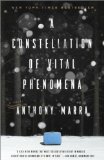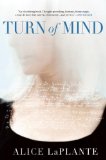Summary | Excerpt | Reading Guide | Reviews | Beyond the book | Read-Alikes | Genres & Themes | Author Bio

How good is Gemini, Carol Cassella's book about a Seattle intensive care physician who becomes overly involved with, then inexorably linked to, her comatose patient, an unidentified hit-and-run accident victim? Good enough to make a reviewer (ok, me) forget about a deadline to review another book for a different editor. Yup. That other book – a not-bad one to boot – had to take a backseat because I was just that engrossed in Dr. Charlotte Reese's story. What's it got that's so great? Whew. What doesn't it have?
First there is the structure. The bare bones of a novel, or the architecture, isn't usually remarkable. It's either effective - that is, it either moves the plot along - or it isn't. It's a job pretty easily accomplished by any published author. Gemini goes beyond this because it has a double story arc. So right from the get-go you're intrigued. You need to know how – or if, or why - the two are connected.
The main plot follows Charlotte Reese as she tends to the medical needs of her unidentified critical care patient, and how she grapples with an inexplicable inability to maintain a professional reserve. This is not normally an issue for her. But this time, this woman who is roughly the same age as Charlotte at 38, is somehow different. Charlotte puzzles over this with her science writer boyfriend, Eric Bryson. While the police in the remote area of Washington State where the woman referred to as Jane Doe was discovered - lying in a roadside ditch, broken, bleeding and in severe shock - are trying to learn her identity, she clings to life by the barest thread. Every procedure intended to sustain her life is performed in the hope that she will regain consciousness and be able to tell them who she is. But no one is coming forward. No one has reported a missing woman. How can it be possible that nobody misses her?
The second story arc features a prepubescent girl named Raney Remington who lives with her maternal grandfather on a farm in a remote area of Washington State, hours from Seattle. She's a whip-smart loner with an endearing sense of humor who loves to sketch or paint the nearby woods and cliffs overlooking the Pacific. She is a motherless child, immersed in her grandfather's survivalist doctrine, distrustful of strangers. One summer she encounters a boy named Bo. "As should be the case with any memorable love story, the first time Raney Remington saw Bo she hated him. She didn't have any choice but to hate him, he was so beautiful. So foreign. After all no exceptional thing can exist for long without a counterbalance - the weight of it would tip a life over." Bo is a too skinny, too scrawny, too pale city kid on summer vacation from some big city that Raney has never seen, and she does everything in her power to make him miserable. And he lets her. Summer after glorious summer.
Then there are the surprises. I thought I knew what happened next, how these two stories would intertwine. Maybe you think you do too. We're both wrong. Turns out (no spoilers) that Bo disappears and Raney grows up to attend art school. Charlotte's intense focus on her as-yet unidentified patient begins to fray the edges of her complicated relationship with Eric. And things get dicey all the way around. Then with expert foreshadowing so delicate that I missed it on the first read, Cassella draws me in with wicked plot twists until I can't wait to find out how it all ends, but I don't want it to end because her descriptions of things, emotions, feelings are so good that I want more.
And then there is the writing. There are no overused similes, no "her spirits soared like an eagle," here. No tried-and-true, easy descriptors. Cassella digs deep and nails it, every time, in a way that seems so natural that it defies all the hard work that went into it. Speaking of Raney's once and only whirlwind encounter with her mother, who had kidnapped her only to abandon her once again, Cassella writes: "For the rest of time Raney would catch a scent of Jean Nate perfume or clove cigarettes, or the mustiness of an old canvas tent, the metallic tang of a Greyhound bus windowsill, and be emptied of gravity and grounding by the rogue wave of an emotion she could not name." Yes. That is the sense memory of loss. I'd call it writing for the gut because your head can get a clever simile but this touches a deeper place. Touch is the operative word there.
So it happens that the doctor who cares too much and the motherless child who loves too foolishly, plus their complicated relationships, plus the mystery woman in the coma are all connected in ways that will intrigue, confound and amaze, all with such mesmerizing prose you too might miss a deadline.
![]() This review was originally published in The BookBrowse Review in April 2014, and has been updated for the
April 2015 edition.
Click here to go to this issue.
This review was originally published in The BookBrowse Review in April 2014, and has been updated for the
April 2015 edition.
Click here to go to this issue.

If you liked Gemini, try these:

A Constellation of Vital Phenomena
by Anthony Marra
Published 2014
A brilliant debut novel that brings to life an abandoned hospital where a tough-minded doctor decides to harbor a hunted young girl, with powerful consequences.

by Alice LaPlante
Published 2012
A stunning first novel, both literary and thriller, about a retired surgeon with dementia who clings to bits of reality through anger, frustration, shame and unspeakable loss.
Your guide toexceptional books
BookBrowse seeks out and recommends the best in contemporary fiction and nonfiction—books that not only engage and entertain but also deepen our understanding of ourselves and the world around us.